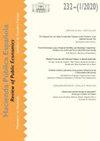改革国际税收:过程是真正的产品吗?
IF 0.7
4区 经济学
Q3 ECONOMICS
Hacienda Publica Espanola-Review of Public Economics
Pub Date : 2016-06-01
DOI:10.7866/HPE-RPE.16.2.5
引用次数: 6
摘要
国际税收改革——各国税收制度如何相互影响——是一个技术上复杂、往往具有重大经济意义、有时在政治上具有爆炸性的问题。一些人预期国际税收在不久的将来会发生重大变化,但没有人知道可能会发生什么变化,或者何时、如何以及如何有效地执行这些变化。本文不是对这些问题进行推测,而是考虑各国试图改革国际税收问题的过程,主要是通过复杂的技术和政治谈判,目的是产生一套改进的“软”法律安排,遵守这些安排和现行制度一样,基本上是自愿的。目前的谈判进程虽然是在经合组织的支持下进行的,但它比早期的国际税收谈判更具包容性。早期的谈判主要是在以资本出口国为主的发达国家之间进行的。更大的包容性可能会使谈判更难以成功结束,但也可能导致一个更广泛地接受为公平的制度。此外,通过目前关于国际税收的长期和密集的谈判所获得的经验也许可以提出一种更有效的办法来处理诸如气候变化等其他“全球公益”问题。本文章由计算机程序翻译,如有差异,请以英文原文为准。
Reforming International Taxation: Is the Process the Real Product?
The reform of international taxation -- how national tax systems interact with each other – is an issue that is always technically complex, often economically significant, and sometimes politically explosive. Some expect major changes in international taxation in the near future but no one yet knows what changes might made or when, how, and how effectively they might be implemented. Instead of speculating about such matters, this paper considers the process by which countries are attempting to reform international taxation problems, essentially through complex technical and political negotiations intended to produce an improved set of “soft” law arrangements, adherence to which will, as in the present system, be essentially voluntary. The current process, although under the aegis of the OECD, is considerably more inclusive than earlier negotiations on international taxation, which were largely between developed countries that were predominantly capital exporters. Greater inclusivity may make negotiations more difficult to conclude successfully but it may also result in a system that will be more widely accepted as fair. Moreover, experience gained through the present prolonged and intensive negotiations on international taxation may perhaps suggest a more fruitful approach to dealing with such other “global public goods” problems as climate change.
求助全文
通过发布文献求助,成功后即可免费获取论文全文。
去求助
来源期刊

Hacienda Publica Espanola-Review of Public Economics
Economics, Econometrics and Finance-Finance
CiteScore
0.90
自引率
14.30%
发文量
14
期刊介绍:
Hacienda Pública Española/Review of Public Economics welcomes submissions on all areas of public economics. We seek to publish original and innovative research, applied and theoretical, related to the economic analysis of Government intervention. For example, but not exclusively: Taxation, Redistribution, Health, Education, Pensions, Governance, Fiscal Policy and Fiscal Federalism.
In addition to regular submissions, the journal welcomes submissions of:
-Survey Reviews, containing surveys of the literature regarding issues of interest in the Public Economics field;
-Policy oriented reviews, showing the current contributions of Public Economics in relation to relevant contemporary issues affecting public decision-makers in the real world (Policy Watch);
-Comments of previously published articles. Contributions to this section should be limited to a maximum of 2 000 words (12 pages). If deemed adequate, the authors of the commented article will be given the opportunity to react in a Reply. Both Comment and Reply will be published together.
Articles for the Survey Reviews and Policy Watch section are subject to the same double blind reviwing procedure. The adequacy of Comments submitted for publication will be evaluated by the Executive Editors.
 求助内容:
求助内容: 应助结果提醒方式:
应助结果提醒方式:


